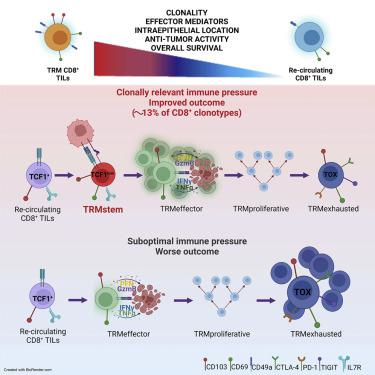Cancer Cell ( IF 50.3 ) Pub Date : 2022-04-14 , DOI: 10.1016/j.ccell.2022.03.008 Carmen M Anadon 1 , Xiaoqing Yu 2 , Kay Hänggi 1 , Subir Biswas 1 , Ricardo A Chaurio 1 , Alexandra Martin 3 , Kyle K Payne 1 , Gunjan Mandal 1 , Patrick Innamarato 1 , Carly M Harro 1 , Jessica A Mine 1 , Kimberly B Sprenger 1 , Carla Cortina 1 , John J Powers 1 , Tara Lee Costich 1 , Bradford A Perez 4 , Chandler D Gatenbee 5 , Sandhya Prabhakaran 5 , Douglas Marchion 6 , Mirjam H M Heemskerk 7 , Tyler J Curiel 8 , Alexander R Anderson 5 , Robert M Wenham 3 , Paulo C Rodriguez 1 , Jose R Conejo-Garcia 9

|
Despite repeated associations between T cell infiltration and outcome, human ovarian cancer remains poorly responsive to immunotherapy. We report that the hallmarks of tumor recognition in ovarian cancer-infiltrating T cells are primarily restricted to tissue-resident memory (TRM) cells. Single-cell RNA/TCR/ATAC sequencing of 83,454 CD3+CD8+CD103+CD69+ TRM cells and immunohistochemistry of 122 high-grade serous ovarian cancers shows that only progenitor (TCF1low) tissue-resident T cells (TRMstem cells), but not recirculating TCF1+ T cells, predict ovarian cancer outcome. TRMstem cells arise from transitional recirculating T cells, which depends on antigen affinity/persistence, resulting in oligoclonal, trogocytic, effector lymphocytes that eventually become exhausted. Therefore, ovarian cancer is indeed an immunogenic disease, but that depends on ∼13% of CD8+ tumor-infiltrating T cells (∼3% of CD8+ clonotypes), which are primed against high-affinity antigens and maintain waves of effector TRM-like cells. Our results define the signature of relevant tumor-reactive T cells in human ovarian cancer, which could be applicable to other tumors with unideal mutational burden.
中文翻译:

卵巢癌的免疫原性由一小部分祖细胞组织驻留记忆 T 细胞控制
尽管 T 细胞浸润与结果之间反复存在关联,但人类卵巢癌对免疫疗法的反应仍然很差。我们报告说,卵巢癌浸润性 T 细胞中肿瘤识别的标志主要限于组织驻留记忆 (TRM) 细胞。83,454 个 CD3 + CD8 + CD103 + CD69 + TRM 细胞的单细胞 RNA/TCR/ATAC 测序和 122 个高级别浆液性卵巢癌的免疫组织化学显示只有祖细胞(TCF1低)组织驻留 T 细胞(TRM干细胞),但不是再循环的 TCF1 + T 细胞,预测卵巢癌的结果。TRM阀杆细胞产生于过渡再循环 T 细胞,这取决于抗原亲和力/持久性,导致最终耗尽的寡克隆、嗜血细胞、效应淋巴细胞。因此,卵巢癌确实是一种免疫原性疾病,但这取决于约 13% 的 CD8 +肿瘤浸润性 T 细胞(约 3% 的 CD8 +克隆型),这些细胞针对高亲和力抗原并维持效应 TRM-波像细胞。我们的结果定义了人类卵巢癌中相关肿瘤反应性 T 细胞的特征,这可能适用于具有不理想突变负荷的其他肿瘤。



























 京公网安备 11010802027423号
京公网安备 11010802027423号